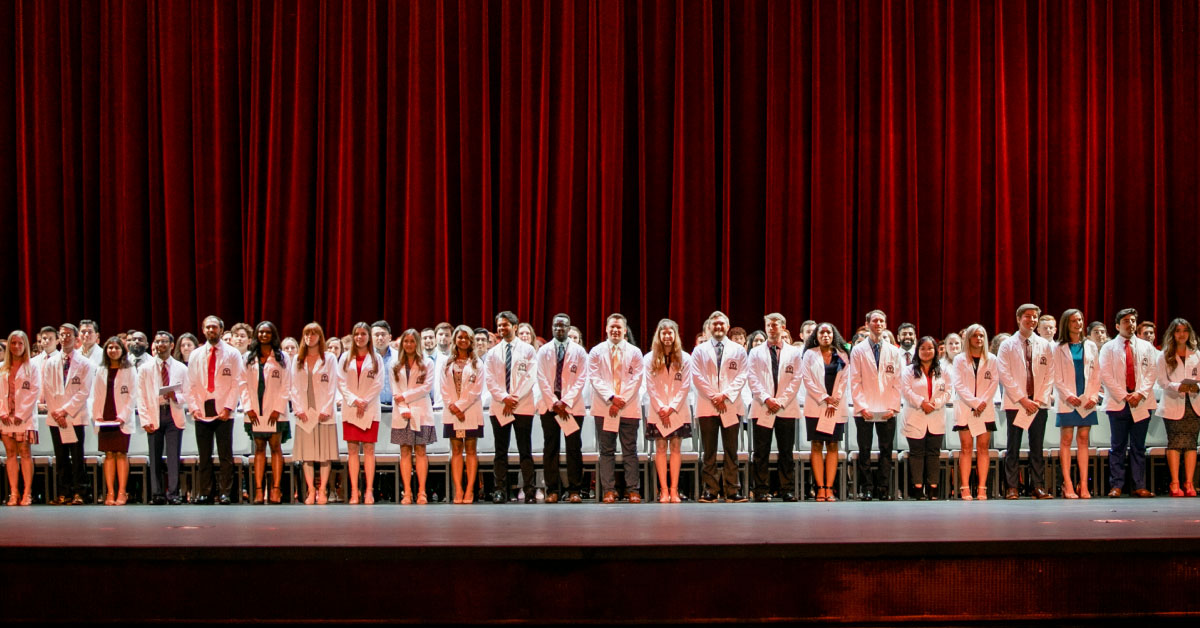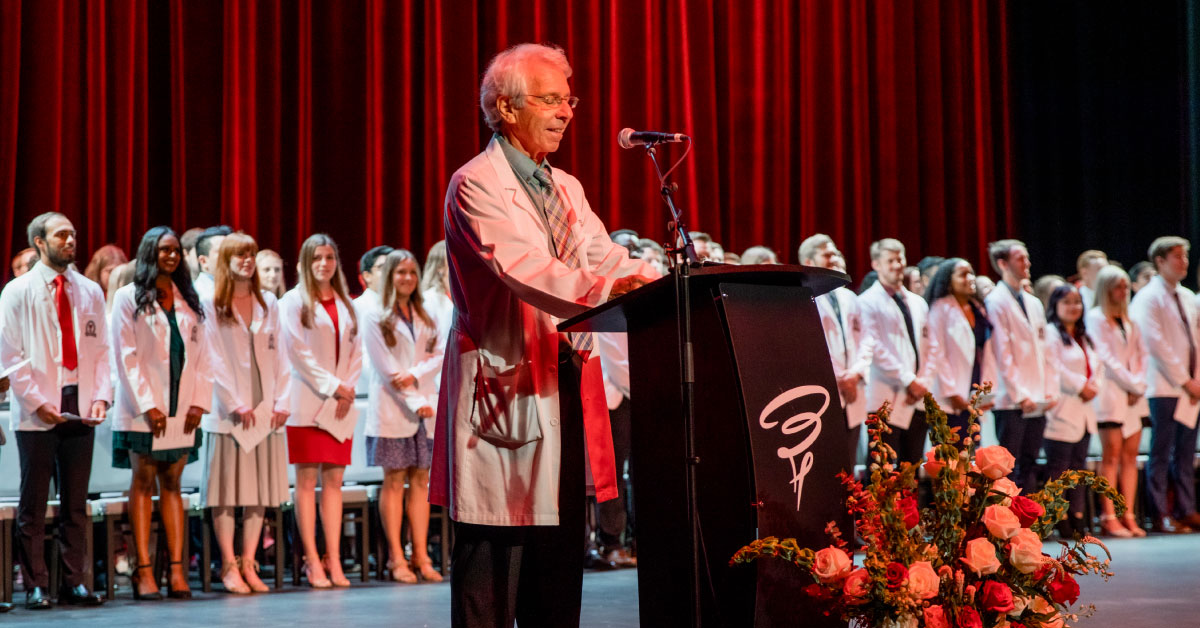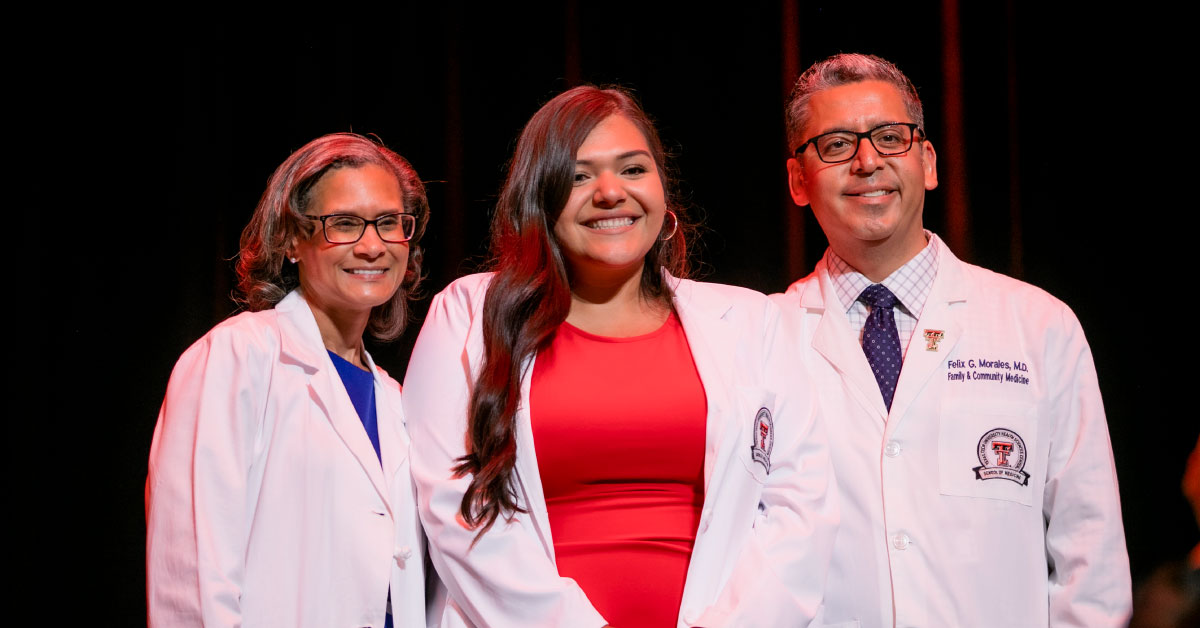TTUHSC Medical Students Receive First White Coat

The Texas Tech University Health Sciences Center (TTUHSC) School of Medicine Class of 2026 pledged their commitment to the profession as they received their white coats Sunday (July 29) at the White Coat Ceremony.
The white coat is one of the most visible symbols of the health care profession. Steven L. Berk, M.D., TTUHSC executive vice president and School of Medicine dean, said for many students, dreams of putting on the white coat begin the day they are accepted into medical school.

“These students have been working very hard for a long time,” Berk said. “They have sacrificed to get to medical school. This is a celebration for them and for their parents, but it's also a time to remind them that while this is a great profession, it comes with responsibilities. When they don their white coats, they're also making a commitment to the profession of medicine, and all the responsibilities and professionalism that it requires.”
According to recent data published by the Association of American Medical Colleges, the United States could see an estimated shortage of between 37,800 and 124,000 physicians by 2034, including shortfalls in both primary and specialty care.
The average GPA for class members is 3.8. Eight students joined the Family Medicine Accelerated Track program, 15 students will earn a joint medical and business degree with the M.D./MBA program, 10 with the joint medical and public health M.D./MPH degree, four students will work toward a dual M.D/Ph.D. degree and five will complete the most recent M.D. and engineering degree.
“This is a competitive group of students,” Felix Morales, M.D., TTUHSC School of Medicine associate dean of admissions said. “Five thousand students applied and out of those, we interviewed 900. We are proud to have the best 180 of those students coming to join our School of Medicine family.”
Berk said traditionally the White Coat Ceremony welcomes medical students into the profession of medicine where they all take an oath promising to always put their patient first, even those who are vulnerable, and most importantly, that they will begin a career of lifelong learning.
“This pandemic was a reminder of the need for physicians also to be teachers for the public, to have a great work ethic and to be committed to doing their very best every day,” Berk said. “The white coat stands for that commitment.”

Students come from 45 different schools, including Wake Forest University, Emory University, Clemson University, University of Notre Dame, University of Texas and Baylor University. One hundred and one students are from the West Texas area with 70 of those from Texas Tech University.
“Not all of them have just graduated college; some have had other jobs like firefighters, EMTs, registered nurses, science teachers and elementary school teachers,” Berk said. “And these students had a tremendous interest in service with many of them volunteering in the COVID-19 pandemic. It's a very well rounded, very competitive class.”
The new medical students also recited their class oath.
“With honor and gratitude, we, the Texas Tech University Health Sciences Center School of Medicine Class of Two Thousand Twenty-Six, remain steadfast in our continual journey to pursue excellence in medicine.
We will honor our role as health care professionals to always regard ourselves as equal members of the patient-centered team, to acknowledge our limitations, to celebrate the strengths of others, and to uphold the ethical standards of the medical profession.
We will commit to being attentive and understanding that health is holistic in our evidence-based care, while upholding a person’s autonomy and individuality.
We will stand for our patients by respecting their diverse backgrounds, beliefs, values, and perspectives to ensure they have access to the highest quality of care.
We accept our responsibility to advocate for the local community around us and the global community beyond us.
We appreciate the sacrifices of those who empowered us to achieve this opportunity to improve healthcare for future generations.
We celebrate the art of medicine as an everlasting endeavor in which we embody the roles of a life-long learner, educator and innovator.
As we don these white coats and the responsibility they symbolize, we eagerly embrace the challenges that lie ahead.”
